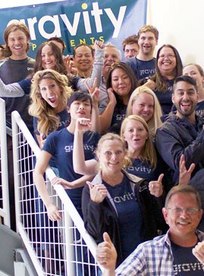 - enthusiastic Gravity people -
- enthusiastic Gravity people - Under this 30-year-old leader’s imaginative plan, the pay of 70 out of 120 people who work at his company, Gravity Payments, and are not presently making that much money, will see their income rise by $5,000 per year until they reach $70,000. They should all get there in 2017. There’s also an immediate pay raise to $50,000 if an employee is not there already (average pay at the check processing firm now is $48,000).
Why is CEO Dan Price making this move?
“I think CEO pay is way out of whack,” he says, tapping into the growing notion that CEOs make far too much money compared to the people who work for them. These days that ratio is said to be about 300:1, with the average CEO salary reported in the $11-14-million range.
“The market rate for me as a CEO compared to a regular person is ridiculous,” Price told the New York Times. “It’s absurd. My salary wasn't $1 million because I need that much to live,” he admitted (to ABC News), “but that's what it would cost to replace me as a CEO. There is nothing in the market that is making me do it.”
So why did he do it? Some talking heads accused Price of publicity seeking after the story appeared widely on cable and network news yesterday. Others practically rolled their eyes at the absurdity of such a boneheaded move and suggested that his company would soon be out of business because he’s paying too much in salaries.
Price himself says that he was led to the idea by conversations with friends who make $40,000 a year and find it a constant challenge to make ends meet, never mind get ahead. Median U.S. household income currently is around $52,000, lower than before the recession. In Seattle, median income is $15,000 more and the cost of living is much higher. Real estate site Trulia.com reports that the average home in Seattle lists for $700,000 (and can be bid even higher in Seattle’s most desirable neighborhoods). In contrast, the average U.S. home sells for around $175,000.
But what prompted Price to make the move was a news story he came across suggesting that people need an income of $70-$75,000 to have enough money to live on and be happy, based on a 2010 Princeton University study. Researchers discovered that “the emotional quality of an individual’s everyday experience, the frequency and intensity of experiences of joy, stress, sadness, anger, and affection that make one’s life pleasant or unpleasant” increases as income goes up – to about $75,000 a year, that is, where happiness apparently plateaus.
Price seemed refreshingly genuine in the few television interviews I’ve seen – and if a bit of an idealist, so what? He’s earned the right to his private experiment in income equality; eleven years ago, he was a Seattle Pacific University student trying to start a business in his dorm room, where he no doubt consumed many more ramen noodle meals than steak dinners.
He also sees the generous pay raise as a good business move, if not in the short term certainly in the long run, “because I want the company to be sustainable even if something happens to me.”
To help things along, he’s cutting his own pay to $70,000 and will leave it there until profits return to a level where the big paycheck can be supported once again.
"I may have to scale back a little bit,” Price admits, “but nothing I’m not willing to do. I’m single. I just have a dog.” And still drives the old Audi he got from a dealer in return for services provided when his business was just getting underway.
What About Minimum Wage?
Clearly, some people aren’t worth hiring at all – at any price. But many others are, because given a reason (and the tools) to excel, they likely will. Their pay should reflect their increasing value as they progress, as they grow into their jobs and help their employers attract more customers, become more efficient, expand, make more money, etc. Business does not owe warm bodies a living, people who could care less about performance but believe that they are, indeed, owed a job. Employers are not welfare providers.
Let’s say, like Seattle, our national government decrees a $15 per hour minimum wage and applies it to all employees everywhere in some time frame (Seattle’s is seven years) without tagging the raise to performance. Some employees will grab the brass ring and fly because they are made that way while others shuffle along without a concern in the world. These under-performers eventually should find themselves back on the street but likely will not, because "that wouldn't be fair". Dan Price, on the other hand, is working toward a minimum wage of $70,000 at his company and is not likely, short of charity, to keep people on if they're not performing – at $70K or $48K or any price. As I opined in my earlier blog post, if your performance excels, you should earn more. If you're a slacker, however, content with just hanging around and collecting a paycheck, you should be re-introduced to the state of unemployment.
So keep one eye on Seattle, as its government-decreed $15 minimum wage settles in. And keep the other eye on Gravity Payments. See which minimum wage one approach works out best.
TakeAway: Your employees are a potential source of competitive advantage. Pay them in step with performance, and you will succeed together.
Content © by Brian E. Faulkner
My earlier Minimum Wage Post: http://www.brianefaulkner.com/blog/minimum-wage-should-be-stricken-from-our-business-vocabulary

 RSS Feed
RSS Feed